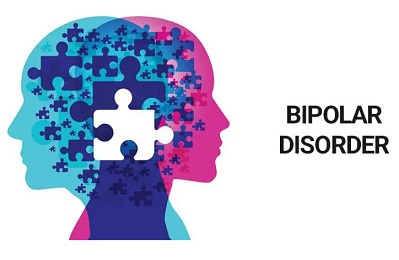BREAKING COVID-19 News! Various Studies And Case Reports Validate That SARS-CoV-2 Can Cause Bipolar Disorder!
Nikhil Prasad Fact checked by:Thailand Medical News Team Jan 23, 2024 1 year, 2 months, 3 weeks, 5 days, 1 hour, 11 minutes ago
COVID-19 News: In the relentless battle against the global COVID-19 pandemic, the focus has predominantly been on the immediate health implications of the SARS-CoV-2 virus. However, an emerging concern is the potential long-term impact on mental health. Beyond anxiety and depression, a novel and scarcely explored connection has surfaced - the potential link between SARS-CoV-2 infection and bipolar disorder (BD). This
COVID-19 News report delves into various studies and compelling case reports, aiming to provide a thorough understanding of the intricate relationship between SARS-CoV-2 and bipolar disorders.
 SARS-CoV-2 Can Cause Bipolar Disorder
SARS-CoV-2 Can Cause Bipolar Disorder
Thailand
Medical News had previously also published an article warning about the possible onset of bipolar disorder after SARS-CoV-2 infection.
https://www.thailandmedical.news/news/covid-19-news-sars-cov-2-infections-can-trigger-onset-of-bipolar-disorder
However, this new article provides more updated cases reports and also explains the possible mechanisms leading to the development of bipolar disorders in Post COVID individuals.
The Global Impact of COVID-19
The staggering global statistics paint a grim picture of the COVID-19 pandemic, with over 2.2 billion infections and nearly 38 million deaths directly or indirectly caused by COVID-19 around the world. Despite advances in detection methods and the availability of vaccines, the consequences persist, not only in terms of physical health but also in the domain of mental well-being. Psychiatric disorders, including major depressive disorder (MDD), generalized anxiety disorders (GAD), post-traumatic stress disorder (PTSD), obsessive-compulsive disorder (OCD), sleep disorders, and cognitive impairments, have become prevalent outcomes directly associated with SARS-CoV-2 infection.
Bipolar Disorder: A Complex Affective Disorder
Bipolar disorder (BD) adds a layer of complexity to the psychiatric aftermath of COVID-19. BD is characterized by recurrent episodes of depression and mania or hypomania, often accompanied by psychotic symptoms. With a lifetime prevalence ranging from 0.1% to 2.4%, BD significantly impacts the quality of life and poses an elevated risk of suicide. Despite extensive research, the elusive etiology of BD involves factors such as inflammation, genetics, epigenetics, metabolism, hormones, neurotransmission, and external stressors.
Emerging Links - Manic Episodes Post-COVID-19
Recent scientific literature has shed light on (hypo)manic episodes occurring in individuals post-COVID-19 infection. Given that manic episodes are a hallmark of BD, exploring the potential association between SARS-CoV-2 and psychiatric disorders is imperative. Identifying undiagnosed or misdiagnosed BD among COVID-19 pa
tients becomes crucial, considering the neuroprogressive nature of BD and the need for early detection and intervention.
At the same time, case reports and cases studies have verified that SARS-CoV-2 is able to lead to the new onset of bipolar disorder.
https://www.hindawi.com/journals/crips/2022/8931599/
https://www.scielo.br/j/trends/a/WDKzQrJfVnktp7rx7cwH47R/?lang=en#
https://pmjn.org.np/index.php/pmjn/article/view/152
https://www.mdpi.com/2077-0383/11/20/6060
https://www.frontiersin.org/articles/10.3389/fpsyt.2022.926084/full
https://www.cureus.com/articles/129930-first-manic-episode-following-sars-cov-2-infection#!/
https://www.sciencedirect.com/science/article/pii/S0165178122002773
https://onlinelibrary.wiley.com/doi/10.1111/bdi.13173’
https://www.cpn.or.kr/journal/view.html?volume=19&number=4&spage=786
https://www.mdpi.com/2673-8112/2/9/94
Analyzing the Connection: Overlapping Factors
Past studies have focused on reported cases of (hypo)mania post-SARS-CoV-2 infection and taken into consideration both patients with and without a history of psychiatric disorders. By categorizing the overlapping factors, including cytokine and inflammatory disorders, corticosteroid use, HPA axis disorders, sleep disturbances, BDNF deficiency, kynurenine pathway hyperactivity, structural CNS changes, neurotransmission disorders, and oxidative stress, these studies aimed to unravel the potential connection between COVID-19 and bipolar disorder.
Overlapping Factors: Systemic Inflammation and Cytokine Storm
A striking parallel between SARS-CoV-2 infection and BD is the induction of systemic inflammation and cytokine storms. Both conditions exhibit increased concentrations of inflammatory cytokines, impacting various neurological processes. These shared pathways encompass synaptic activity, hippocampal neurogenesis, limbic structures, neural signaling, the kynurenine pathway, the HPA axis, oxidative stress, CNS structural changes, and neurotransmission.
Kynurenine Pathway Activation and Oxidative Stress
Activation of the kynurenine pathway is evident in both SARS-CoV-2 infection and BD, contributing to neurodegeneration, excitotoxicity, and ROS generation. Oxidative stress emerges as a commonality, leading to increased levels of lipid peroxidation and damage to proteins and RNA. The rapid onset of oxidative stress in COVID-19 patients may contribute to nerve structure damage and morphometric changes in the brain, initiating bipolar disorder symptoms.
Structural CNS Changes and Sleep Disturbances
White matter abnormalities observed in both SARS-CoV-2 and BD patients suggest potential influences on signaling pathways and hyperactivation of intact fibers, contributing to BD symptoms. Additionally, sleep disturbances, prevalent in both conditions, can activate the HPA axis and induce neurotransmitter secretion, aligning with BD characteristics.
Examining BDNF, HPA Axis, and Corticosteroid Therapy
While alterations in brain-derived neurotrophic factor (BDNF), the HPA axis, and the use of corticosteroids show some consistency between SARS-CoV-2 and BD, there are variations that warrant further exploration. BDNF levels decrease in BD, while SARS-CoV-2 infection shows mainly a reduction, potentially mediating the development of mania. The influence of corticosteroid therapy on mania requires careful consideration, with 38.8% of post-COVID (hypo)mania cases involving steroid use.
Implications for Clinical Practice
As we unravel the interconnected factors, clinicians must be vigilant in recognizing potential affective episodes, including mania, in vulnerable patients. Monitoring patients with severe COVID-19, limiting corticosteroid therapy to essential cases, and considering interventions like melatonin supplementation or antioxidant support may mitigate the risk of developing bipolar disorder or experiencing relapses in those predisposed.
Conclusion
In conclusion, this extensive exploration of the potential link between SARS-CoV-2 and bipolar disorder sheds light on the complex interplay of factors contributing to neuropsychiatric manifestations post-COVID-19. While statistically, the incidence of (hypo)mania post-COVID-19 is relatively low, the shared pathophysiological mechanisms suggest a nuanced relationship that warrants further investigation. Clinicians and researchers alike should remain vigilant, extending follow-up periods for vulnerable patients, and exploring individualized interventions to minimize the long-term neuropsychiatric effects of COVID-19. As we continue to navigate the challenges posed by the ongoing pandemic, a holistic approach that considers both physical and mental well-being becomes increasingly imperative.
For the latest
COVID-19 News, keep on logging to Thailand Medical News.
